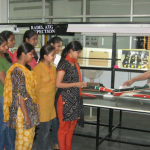The original article appeared on Mydigitalfc
With India aiming to be a self-reliant manufacturer and exporter of defence products, the number of required trained engineer in the aerospace and defence (A&D) sector is expected to grow at least four folds.
“Based on a very conservative figure of even three engineers per MSME (taking into account the micro as well as small units), there is an immediate need today for approximately 18,000 trained engineers in this sector. However, it is imperative that the A&D sector grows four-fold to make India not only self-reliant but an exporter of defence products. The projected requirement of trained (not just qualified) engineers would then jump to 72,000 or more over the next few years,” G Raj Narayan, founder managing director of the Bangalore-based Radel Group, told FC.
To meet this large requirement, the Bangalore-based group, whose Arm- Radel Advanced technology is a design and manufacturing company promoted by technocrats with four decades of experience in the aerospace, defence and electronics industry, has now come up with DRONA School of Engineering Practice, the first of its kind finishing school in the country focuses on creating skilled engineers, especially for the electronics, aerospace and defence sectors.
DRONA offers courses ranging from the flagship holistic six-month programme, Campus2Career Apprenticeship, to short three-day orientation programmes of aerospace, defence and electronics sectors.
“We are expecting a four-fold increase in the number of students over the next couple of years. We are also gearing up to team up with leading educational institutions across the country and provide customised training for industries for their new recruits,” said Narayan.
Significantly, a recent industry study suggested that even a 20 to 25 per cent reduction in imports could directly create an additional one lakh or more of highly skilled jobs in India. If the government strives to extend the indigenous content to 70 per cent in the next few years, then this figure can swell even further.
Narayan said that with the emphasis now on ‘make in India’ and with thrust on defence indigenisation, there is need for a quantum jump in the number of competent industries entering this sector. To meet the projected targets, large organisations such as the defence PSUs have no option but to create an efficient supply chain through the participation of MSMEs. MSMEs contribute significantly to employment generation. It is reported that more than 6,000 MSMEs are already integrated into the A&D sector as suppliers mainly to PSUs and this number is growing.

